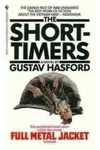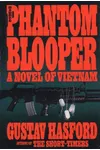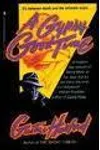Picture a gritty storyteller who turned the chaos of war into raw, unforgettable prose—meet Gustav Hasford! A United States Marine veteran, Hasford channeled his Vietnam War experiences into the searing novel The Short-Timers, which inspired Stanley Kubrick’s iconic film Full Metal Jacket. His unflinching, darkly humorous take on the horrors of combat made him a standout voice in war literature.
Born in Alabama, Hasford’s journey from small-town kid to literary maverick is as compelling as his stories. Let’s dive into the life and legacy of this underappreciated author whose words still pack a punch.
The Making of Gustav Hasford
Gustav Hasford was born on November 28, 1947, in Haleyville, Alabama, and grew up in Russellville. A rebellious spirit, he ditched his high school graduation exams to protest Alabama’s education system, opting instead to join the U.S. Marine Corps in 1966. As a combat correspondent during the Vietnam War, he reported from the front lines, penning stories for Leatherneck Magazine and Pacific Stars and Stripes. His time in the 1968 Battle of Huế, where he earned a Navy & Marine Corps Achievement Medal with Valor Device, shaped his visceral, no-holds-barred writing style.
After returning home, Hasford moved to Washington State, attended community college, and began crafting fiction. His early stories caught the eye of science fiction writers at the 1978 Milford Writer’s Workshop, where editor Frederik Pohl encouraged him to submit The Short-Timers to Bantam Books. That moment sparked his literary career.
Gustav Hasford’s Unforgettable Stories
Hasford’s debut, The Short-Timers (1979), is a gut-punch of a novel, following Private Joker through the brutal dehumanization of Marine boot camp and the chaos of Vietnam’s Tet Offensive. Written in a stark, present-tense style, it blends black humor with horror, earning praise from Newsweek as “the best work of fiction about the Vietnam War.” Its raw authenticity, drawn from Hasford’s own experiences, set it apart from other war narratives.
In 1990, Hasford published The Phantom Blooper, a sequel that picks up with Joker as a POW grappling with the war’s moral complexities. The novel dives deeper into the Vietnamese perspective, showcasing Hasford’s ability to humanize both sides. Critics lauded its bold take, though some found its politics provocative. His final work, A Gypsy Good Time (1992), shifted gears to a noir detective story set in Los Angeles. While less acclaimed, its sharp dialogue and gritty vibe reflect Hasford’s versatile voice.
Hasford’s style—terse, vivid, and unapologetic—mirrors the intensity of war itself. He used Gothic elements like ghosts and monsters to strip away romanticized notions of combat, revealing its psychological toll. His work stands alongside Michael Herr’s Dispatches but feels uniquely personal, like a dispatch from the soul of a soldier.
Why Gustav Hasford Matters
Hasford’s influence looms large, even if his name isn’t a household one. The Short-Timers became the backbone of Full Metal Jacket (1987), a film co-scripted by Hasford, Kubrick, and Herr that’s still hailed as a definitive Vietnam War depiction. Despite a dispute over his screenplay contributions, the film’s raw power owes much to Hasford’s prose. His novels, though out of print since 1992, remain cult favorites among war fiction fans for their unflinching honesty.
Hasford’s legacy is bittersweet. His refusal to let The Short-Timers be republished as Full Metal Jacket cost him royalties but preserved his artistic integrity. Living a turbulent life marked by legal troubles and untreated diabetes, he died in 1993 at 45, leaving an unfinished Vietnam trilogy. Yet his work continues to resonate, reminding us of war’s human cost.
- Born: November 28, 1947, Haleyville, Alabama
- Key Works: The Short-Timers (1979), The Phantom Blooper (1990), A Gypsy Good Time (1992)
- Awards: Navy & Marine Corps Achievement Medal with Valor Device (1968)
Snag a copy of The Short-Timers and dive into Gustav Hasford’s raw, haunting world of war and wit!


